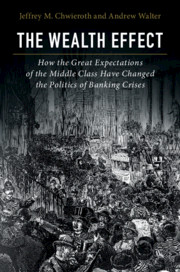
-
Select format
-
- Publisher:
- Cambridge University Press
- Publication date:
- 18 March 2019
- 21 March 2019
- ISBN:
- 9781316649992
- 9781107153745
- 9781316607787
- Dimensions:
- (228 x 152 mm)
- Weight & Pages:
- 0.96kg, 596 Pages
- Dimensions:
- (228 x 152 mm)
- Weight & Pages:
- 0.85kg, 596 Pages
You may already have access via personal or institutional login
Book description
The politics of major banking crises has been transformed since the nineteenth century. Analyzing extensive historical and contemporary evidence, Chwieroth and Walter demonstrate that the rising wealth of the middle class has generated 'great expectations' among voters that the government is responsible for the protection of this wealth. Crisis policy interventions have become more extensive and costly - and their political aftermaths far more fraught - because of democratic governance, not in spite of it. Using data from numerous democracies over two centuries, and detailed studies of Brazil, the United Kingdom and the United States, this book breaks new ground in exploring the consequences of the emerging mass political demand for financial stabilization. It shows why great expectations have induced rising financial fragility, more financial sector bailouts and rising political instability and discontent in contemporary democracies, providing new insight to anyone concerned with contemporary policy and politics.
Awards
Winner, 2020 Stein Rokkan Prize, European Consortium for Political Research
Winner, 2021 IPE Section Best Book Award, International Studies Association
Reviews
‘Special-interest politics figure importantly in all scholarly analyses of the causes and resolution of financial crises. Marshalling an amazing array of historical, statistical and narrative evidence, Chwieroth and Walter show that this point applies not just to the bankers who are commonly seen as the key players in these complex financial events, but also to the households whose deposits and savings are at risk. This observation has powerful implications for how financial crises play out in our modern era of mass democratic politics. The literature on financial crises will never be the same.'
Barry Eichengreen - George C. Pardee and Helen N. Pardee Professor of Economics and Political Science, University of California, Berkeley
'The global pandemic of banking crises, and government-sponsored bailouts in response to those crises, are both unprecedented phenomena. Such new and socially costly phenomena beg for deep inquiry by political scientists seeking to understand their political roots, and The Wealth Effect offers just such an inquiry. It argues convincingly that bailouts and the severity of crises are connected to each other, and both reflect a new underlying politics in which the protection of banks has become popular with a broad class of voters. This book challenges mechanical views of risks that abstract from politics, and in doing so, calls upon voters in democracies to look in the mirror when seeking causes for their financial system, and fiscal, troubles.'
Charles W. Calomiris - Henry Kaufman Professor of Financial Institutions, Columbia University, New York
'A fascinating and novel argument about the politics of finance before and after the Great Recession. Tracing the development and effects of a an enlarged 'bailout' constituency, involving both wealthy and middle class citizens, this book offers valuable lessons about finance, class politics and the workings of democracy.'
Nancy Bermeo - University of Oxford and Princeton University
Contents
Metrics
Altmetric attention score
Full text views
Full text views help Loading metrics...
Loading metrics...
* Views captured on Cambridge Core between #date#. This data will be updated every 24 hours.
Usage data cannot currently be displayed.
Accessibility standard: Unknown
Why this information is here
This section outlines the accessibility features of this content - including support for screen readers, full keyboard navigation and high-contrast display options. This may not be relevant for you.
Accessibility Information
Accessibility compliance for the PDF of this book is currently unknown and may be updated in the future.


